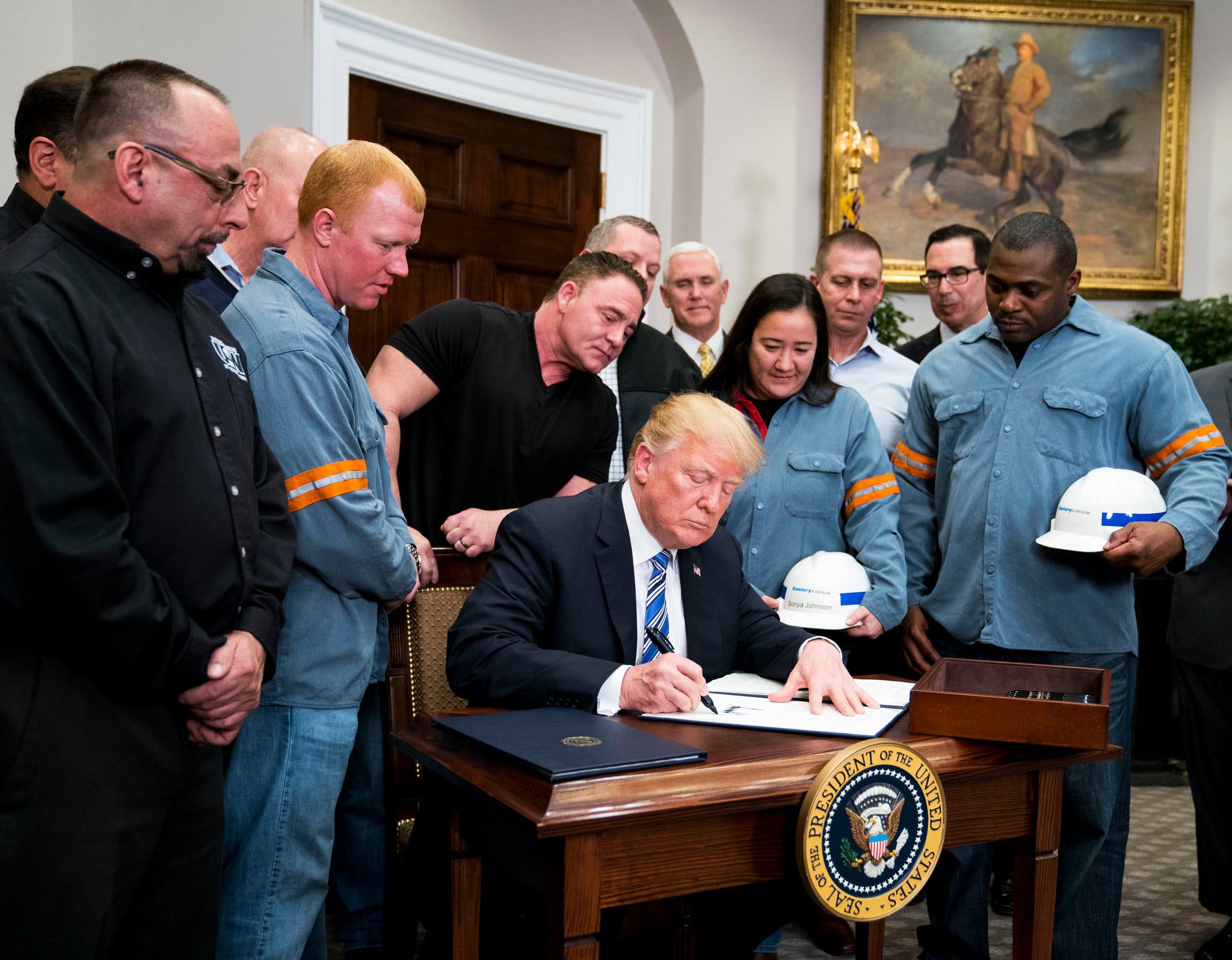Trump Administration Considers Tariffs On Aircraft And Engines

Table of Contents
Potential Targets and Reasons for Tariffs
The Trump administration's consideration of tariffs on aircraft and engines is deeply rooted in the ongoing trade dispute between the US and the EU, specifically concerning alleged illegal subsidies provided to Airbus. This dispute, a long-running battle at the World Trade Organization (WTO), has led to the threat of retaliatory tariffs on both sides. The potential targets for these tariffs are wide-ranging and include a variety of aircraft and engine models produced by both Boeing and Airbus.
- WTO Dispute: The WTO's rulings against Airbus subsidies form the cornerstone of the US justification for imposing tariffs. These rulings found that Airbus received billions of dollars in illegal government support, giving it an unfair competitive advantage.
- Retaliatory Tariffs: The EU has already implemented retaliatory tariffs on various US goods in response to earlier US tariffs. The potential for escalation is significant, with both sides threatening further action.
- Specific Aircraft Models: While a definitive list remains unclear, the potential targets likely include various Airbus aircraft models, particularly those benefiting from the alleged subsidies. Boeing aircraft, while less directly targeted, could also be affected by retaliatory measures.
- Trump Administration's Justification: The administration’s justification centers on leveling the playing field and protecting American aerospace manufacturers from unfair competition. They argue that Airbus’s subsidies distort the market, harming Boeing’s competitiveness and costing American jobs.
Economic Impact of Aircraft and Engine Tariffs
The economic impact of tariffs on aircraft and engines would be far-reaching, impacting both domestic and international markets. Supply chains would be disrupted, potentially leading to significant job losses in the aerospace sector and related industries. Furthermore, increased prices for aircraft and components would affect airlines and ultimately consumers.
- Impact on US Aerospace Manufacturers (Boeing): While Boeing could initially benefit from tariffs on Airbus, the retaliatory measures from the EU could significantly offset these gains. The impact on Boeing's supply chain and overall profitability would be substantial.
- Impact on International Aerospace Manufacturers (Airbus): Airbus would face direct and considerable losses from US tariffs. Their sales to US airlines and the impact on their global supply chain would severely damage their financial performance.
- Job Losses in Related Industries: The aerospace industry is a complex ecosystem, and tariffs would inevitably lead to job losses not only in aircraft manufacturing but also in related sectors like parts suppliers, maintenance, and logistics.
- Increased Aircraft Prices: Increased costs due to tariffs would be passed onto airlines, resulting in higher ticket prices for consumers and potentially reduced air travel demand.
International Response and Political Ramifications
The imposition of tariffs on aircraft and engines would trigger significant international repercussions, particularly a strong response from the EU. This could lead to escalating trade tensions, further damaging already strained international relations and potentially affecting global trade in other sectors.
- Retaliatory Measures from the EU: The EU has already threatened retaliatory measures, and the imposition of tariffs on aircraft and engines would undoubtedly trigger a significant response impacting various US industries.
- Impact on US-EU Relations: The trade dispute has already severely strained US-EU relations. Further escalation through aircraft and engine tariffs would likely exacerbate this and hinder cooperation on other issues.
- Broader Implications for Global Trade: The action could set a dangerous precedent, potentially prompting other countries to engage in similar protectionist measures and further disrupting global trade flows.
- Political Motivations: The decision to impose tariffs may be influenced by political factors beyond purely economic considerations, particularly in the context of the broader trade war initiated by the Trump administration.
Conclusion
The Trump administration's consideration of tariffs on aircraft and engines presents a complex and potentially damaging situation. The potential targets are significant players in the global aerospace industry, and the economic consequences, both for the US and its trading partners, could be severe. The international response and the escalation of trade tensions could have far-reaching geopolitical implications. This situation highlights the interconnectedness of the global economy and the significant risks associated with protectionist trade policies. The consideration of these tariffs necessitates close monitoring of the situation. Stay informed about the latest developments regarding the Trump administration's potential tariffs on aircraft and engines to understand the evolving impact on global trade and the aerospace sector. Further research into the specifics of the proposed tariffs and their potential consequences is strongly encouraged.

Featured Posts
-
 Is Sylvester Stallones Appearance In Jason Stathams Movie A Calculated Move
May 11, 2025
Is Sylvester Stallones Appearance In Jason Stathams Movie A Calculated Move
May 11, 2025 -
 Knicks Vs Bulls Betting Preview Expert Picks Stats And Odds February 20 2025
May 11, 2025
Knicks Vs Bulls Betting Preview Expert Picks Stats And Odds February 20 2025
May 11, 2025 -
 The Impact Of A Childhood Tie On Payton Pritchards Basketball Career
May 11, 2025
The Impact Of A Childhood Tie On Payton Pritchards Basketball Career
May 11, 2025 -
 Womans Grave Accusation Against Prince Andrew Days Numbered
May 11, 2025
Womans Grave Accusation Against Prince Andrew Days Numbered
May 11, 2025 -
 Jeremy Stephens Shocking Return To The Ufc Fan Reactions
May 11, 2025
Jeremy Stephens Shocking Return To The Ufc Fan Reactions
May 11, 2025
